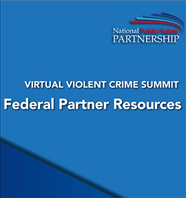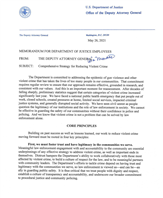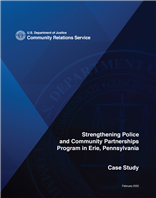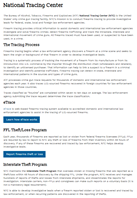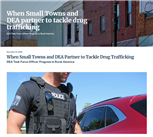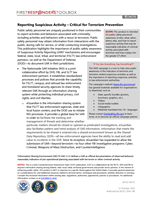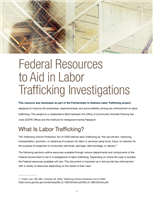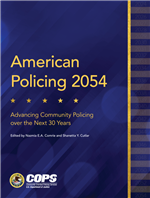ATF Training Resources
ATF regularly presents training for Special Agents at various locations across the country, and the training sessions typically include space for attendance by officers from other Federal, State, and local law enforcement agencies. Agencies can contact their local ATF office to determine scheduling and availability. Topics include: Basic Undercover Operations, Advanced Undercover Operations, Rural Tactical Operations, Social Media, Cell Phone Exploitation, Firearms Trafficking and FFL Burglaries, Gang-Related RICO Investigations, and Officer Safety and Armed Individuals.
FBI Law Enforcement Enterprise Portal
The FBI's Law Enforcement Enterprise Portal (LEEP) is a gateway providing law enforcement agencies, intelligence groups, and criminal justice entities access to beneficial resources. These resources will strengthen case development for investigators, enhance information sharing between agencies, and be accessible in one centralized location.
FBI Crime Data Explorer
The FBI's Crime Data Explorer (CDE) aims to provide transparency, create easier access, and expand awareness of criminal, and noncriminal, law enforcement data sharing; improve accountability for law enforcement; and provide a foundation to help shape public policy with the result of a safer nation.
Precision Policing Initiative (PPI) Toolkit
This toolkit shares information and resources from the COPS Office Precision Policing Initiative (PPI) and other collaborative efforts to provide safer neighborhoods by leveraging partnerships, analysis, research, and technology. The information and resources shared in this toolkit can help law enforcement agencies learn more and determine whether similar activities could benefit their agencies
2021 PSP Virtual Violent Crime Summit: Federal Partner Resources
The PSP Virtual Violent Crime Summit took place on April 21-22, 2021 and convened criminal justice leaders and key stakeholders from PSP sites, U.S. Department of Justice (DOJ) officials, subject-matter experts (SMEs), and other field-based partners to examine topics of interest and additional evidence-based practices to increase public safety, reduce violence, and enhance partnerships in the participating communities. The virtual event featured the following: • Keynote Address on the Pandemic, Social Unrest, and Crime in U.S. Cities • Plenary and breakout sessions • PSP Law Enforcement Leaders' Roundtable • Information on DOJ violence reduction resources Session Description: This session highlights the invaluable resources available to PSP sites through each DOJ law enforcement agency (ATF, DEA, the FBI, and USMS). Federal law enforcement leaders share practical examples of results achieved in several PSP sites as a direct result of federal law enforcement agency collaboration and contributions.
Deputy Attorney General Memorandum: Comprehensive Strategy for Reducing Violent Crime
Memorandum from Deputy Attorney General Lisa Monaco to US Department of Justice employees addressing the strategy to reduce violent crime.
Strengthening Police and Community Partnerships Program in Erie, Pennsylvania: Case Study
In April 2018, the Community Relations Service (CRS) delivered the Strengthening Police and Community Partnerships (SPCP) facilitated dialogue program in Erie, Pennsylvania. The goals of the SPCP program are to engage local law enforcement and community leaders in dialogue to identify issues and solve problems collaboratively, increase local capacity, develop partnerships, and develop local solutions to local problems. The program is also designed to help local leaders address longstanding community distrust and other historical barriers that hinder police-community partnerships and to improve trust and develop partnerships between law enforcement officers and the diverse communities they serve. Approximately 80 diverse leaders participated in the Erie SPCP program, representing local youth, refugees, faith groups, law enforcement, social services groups, business and community groups,andcivilrightsorganizations.Duringtheprogram,participantsidentifiedissuesimpacting police-community relations and then developed solutions to address each issue. Each stakeholder group selected representatives to participate in the Erie SPCP Council, which was tasked with implementing the solutions. The Erie SPCP Council has met once a month since April 2018. In May 2021, CRS conducted a case study to identify the impacts and outcomes of the Erie SPCP program and Erie SPCP Council on police-community relations. In addition, the case study measuredthecollaborationsamongEriecityofficials,thepolicedepartment,andcommunity leaders.Theseoutcomesandimpactswereidentifiedbyanalyzingdataco...
National Tracing Center
The Bureau of Alcohol, Tobacco, Firearms and Explosives (ATF) National Tracing Center (NTC) is the United States’ only crime gun tracing facility. NTC’s mission is to conduct firearms tracing to provide investigative leads for federal, state, local and foreign law enforcement agencies.
When Small Towns and DEA Partner to Tackle Drug Trafficking
Officially called the DEA State and Local Task Force Program, the program seeks to develop highly successful drug investigations by combining federal expertise with TFOs’ investigative talents and detailed knowledge of their communities, businesses and geography, along with the relationships these officers have developed.
First Responder’s Toolbox: Reporting Suspicious Activity — Critical for Terrorism Prevention
The First Responder Toolbox is an ad hoc, Unclassified reference aid intended to promote counterterrorism coordination among federal, state, local, tribal, and territorial government authorities and partnerships with private sector officials in deterring, preventing, disrupting, and responding to terrorist attacks.
Federal Resources to Aid in Labor Trafficking Investigations
This publication, Federal Resources to Aid in Labor Trafficking Investigations, was developed as part of the Partnerships to Address Labor Trafficking project, designed to improve awareness, responsiveness, and accountability on labor trafficking among law enforcement, businesses, communities, the courts, and other stakeholders.
American Policing 2054: Advancing Community Policing over the Next 30 Years
To commemorate the 30th anniversary of its establishment, the COPS Office invited community members and leaders in law enforcement, public safety research, and civil rights to contemplate the next 30 years in American policing. This publication collects essays by a variety of contributors from all ranks of law enforcement as well as researchers and civic and civil rights leaders, all of whom touch on one or more principles of community policing—organizational change, problem solving, or partnerships—and present varied but ultimately optimistic predictions for the future.




